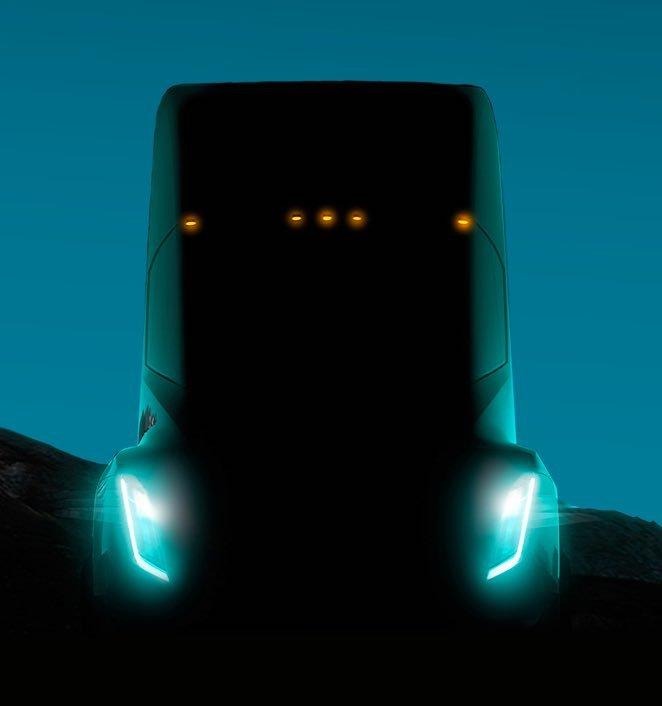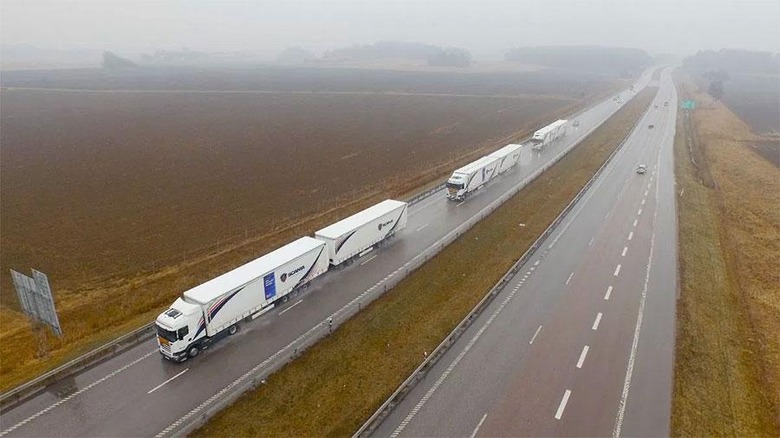6 Key Tesla Truck Facts We Need To Hear Today
Tesla CEO Elon Musk doesn't believe in making his life easy. Model 3 production may only be slowly ramping up now, but that hasn't stopped the electric-obsessed automaker from holding a whizz-bang launch for its next product, the Tesla truck. It's a chance today to finally see the vehicle that Musk has promised will revolutionize haulage: here are the big questions he needs to answer.
What will it look like?
Big rig aesthetics may not be top of the list for most fleet owners – though how aerodynamically slippery they are certainly is – but Tesla needs attention. The Tesla truck can't afford to slip into the background on the highway, like most other semis out there today. After all, it's a rolling billboard for Elon Musk's aggressive vision of electrification.

Here, though, we have the greatest idea of what to expect. Tesla has already been teasing images of the truck, a sleek, fared in behemoth that wouldn't look out of place in a science-fiction movie. Meanwhile, less official images have dragged away the clandestine shadows of Tesla's teasers.
What's the range?
Not all haulage is created equal. Some rigs are expected to cross the country; others make more local trips, covering the last few miles between depots and stores. As a result, just how far Tesla's truck can go on a charge is something the automaker will have to confirm today.
Like Tesla's cars – or, indeed, its Powerwall domestic energy storage units – the truck will use some number of the company's modular battery packs. Again, as in the cars, they'll probably be mounted horizontally and low down, so as to keep the center of gravity low and thus the whole vehicle more stable. We're expecting to see 200-300 miles as the headline figure for range, which is enough for local use.
When those batteries are depleted, meanwhile, all eyes will be on how long it will take to recharge them. Don't expect to see a Tesla truck at the local Supercharger station: even the more recent, higher-powered versions will likely be too slow for haulage purposes. A 150W supply – or even higher – seems like a sure thing.
How much does it cost?
There are two big parts to the truck cost story. On the one hand there's the upfront price of the vehicle, which has to be taken into account with payload capacity. Haulage companies are going to need to do the math on what the Tesla semi is costing them, and how much it'l be able to transport for them.
There's another big consideration, however, and that's operating cost. Price per mile encompasses not only the cost of energy – whether diesel in traditional haulers, or electricity in a Tesla truck – but servicing, maintenance, and downtime for things like refueling. If Elon Musk wants businesses to take the new truck seriously, Tesla will need to demonstrate that the numbers work out.
Will it drive itself?
Tesla hasn't been shy about pushing its vision of driverless vehicles. The cars it sells today have Autopilot, one of the more capable semi-autonomous systems on the market, allowing the person behind the wheel to hand over some control on highways and divided roads. Big question is, will travel-weary truckers get to do the same?
Fully autonomous trucks are still some way out, but there are suggestions among industry experts that they'll actually reach the market sooner than driverless cars will. For a start, trucks spend a disproportionate amount of time on highways, which are generally easier to manage for autonomous systems than urban areas are. Even if it's not capable of fully driving itself, a Tesla truck that can take on the chore of highway driving and then hand over to a human for the last few miles could be a huge boon in both comfort and safety.

However, trucks have another possibility: road trains, or "pontooning". Multiple vehicles forming up into a long chain has a number of benefits: it can be more aerodynamically efficient, and it also helps reduce cognitive load on the human drivers in the following trucks. To work, it'll need not only a capable autonomous driving AI but also inter-vehicle communications, both things Tesla is already working on.
Has anyone ordered them?
Tesla's last major event, for the Model 3, kicked off a huge round of reservations. Would-be electric car drivers, loving the idea of a $35k+ EV, put down $1,000 apiece to stake a place in the pre-order line. Indeed, hundreds of thousands of people signed up for the Model 3, without even knowing final pricing, equipment, performance, or many other factors.
The haulage industry is likely to be more conservative than consumers, however. As a result, that same splashy reservations process isn't going to work for the Tesla truck. Indeed, what investors and analysts alike – not to mention automakers already in the big rig business – will be looking for is who might have already signed up.
According to Musk, Tesla lifted its veil of extreme secrecy during the design process and talked it through with some potential customers. After all, a truck is a lot different to a car, even if they're both electric, and Tesla needed to make sure its vision was palatable to fleet owners. Consider us very intrigued as to whether any of those potential customers have gone on to actually put down the money for an order.
When will it hit the road?
Is it any good; how much will it be; and when can we get it? They're the big Tesla truck questions, and the last one taps into a problem the company already finds itself mired in. It's fair to say that Model 3 production hasn't been the free-flowing process Tesla might have hoped it would be, and that could make investors and would-be truck buyers nervous.
Previous suggestions from Musk & Co. have pointed to a 2-3 year timeline for the Tesla truck to arrive on the road. That depends on a number of factors, not just production but whether the company can manufacture sufficient batteries for the vehicles. It'll put significant attention onto the Gigafactory, and if that can finally end the bottleneck on power pack supplies.
Wrap-up
No automaker quite puts on an event like Tesla does. The company's ambitious plans, in combination with its outspoken CEO, give it a heft well in excess of its sales figures in the industry. Its fans are vocal and enthusiastic, to a degree traditional automakers could only dream of.
Nonetheless, the haulage industry is a different beast. If Tesla wants its truck to succeed, it'll need more than just a high-profile reveal. The math needs to add up, and buyers need to be convinced that their pre-orders will arrive on schedule. We'll find out how close to that Tesla can promise tonight, from 8pm PT.
